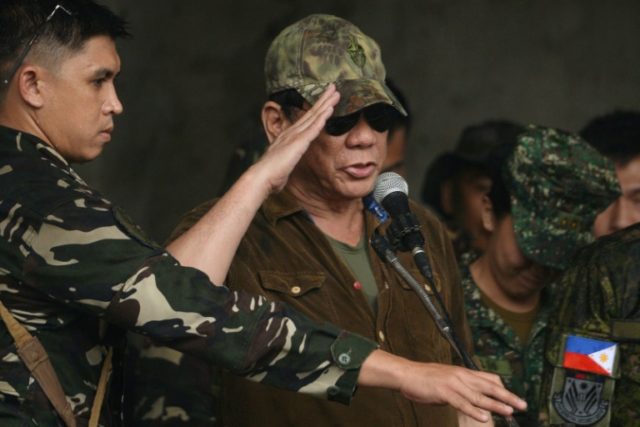Philippines President Rodrigo Duterte has announced a ten-day ceasefire against the Communist Party of the Philippines-New People’s Army (NPA), a Marxist terrorist group that relaunched a campaign against the government this year.
Duterte told reporters that the ceasefire would last from December 24 to January 2 and is meant to allow citizens to enjoy the Christmas holiday without worrying about being caught in the middle of a military operation against the group.
The ceasefire is unilateral, but presidential palace spokesman Harry Roque stated that the government hopes that the NPA will “do a similar gesture of goodwill” to the civilians of the predominantly Christian nation.
“The ceasefire is a unilateral action of government to refrain from attacking. A lot of people are going around, even at night, enjoying Christmas day or whatever. Going to masses,” Duterte said on Wednesday. “I do not want to add more strain to what people are now suffering.”
Before officially announcing the ceasefire, the Philippine Star notes that Duterte clarified that the intent of the ceasefire was not to show goodwill to the terrorist group, but to “the rest of humankind or Filipinos,” who he hopes will enjoy Christmas “without stress.”
Roque told reporters Wednesday that Duterte had made the decision Tuesday night, hoping a ceasefire “would lessen the apprehension of the public this Christmas season.”
“In the observance of this occasion, we hope that all Filipinos would stand together as one nation and aspire for peace in our beloved Philippines,” he stated.
The Philippine outlet Rappler confirms that the nation’s police have told reporters that they will stop operations against the group immediately in observance of the ceasefire.
The corresponding memo circular will be issued soonest so that all PNP units, offices and stations will be guided accordingly,” PNP spokesperson Chief Superintendent Dionardo Carlos told reporters.
Over 90 percent of the population of the Philippines is Christian, and an estimated 86 percent adhere to Roman Catholicism. Christmas is one of the nation’s most celebrated holidays, along with Good Friday and Easter. Citizens typically decorate towns with elaborate light displays featuring the Philippine lanterns known as “parols” and cook traditional meals for Noche Buena, or Christmas Eve.
Before Wednesday’s announcement, the Philippine government had announced that it anticipated the potential for ambush attacks during the Christmas season and police would place special emphasis in their work on preventing them. The Communist Party of the Philippines and its “military wing,” the NPA, will be celebrating their anniversary on December 26, and occasion that has placed the government on high alert.
The Philippine military said through a spokesman that officers had advised troops to work to prevent provoking further attacks by being “directed to remain faithful and committed in the performance of their mandate to ensure peace and security in the communities, protect human rights and follow the rule of law.”
Duterte branded the NPA, a U.S.-designated terrorist group, a terrorist organization in late 2017, after promising peace talks with the group as a presidential candidate in 2016. Among his campaign promises generally were to reach out to “rebel” groups like the NPA and Islamic groups like the Moro Islamic Liberation Front (MILF) in the hope of starting dialogues. Duterte took office in June 2016; by July, he had announced he would no longer seek talks with the NPA, after terrorists attacked Civilian Armed Forces Geographical Unit (CAFGU) fighters in southern Davao, Duterte’s home city.
The Philippine government was forced to take its attention off of the NPA in May of this year, however, when affiliates of the Islamic State attempted to establish a “caliphate” in Marawi, the nation’s only Islamic city. Marawi is also located on Mindanao, the island that is home to Davao and where Duterte still lives. Duterte imposed a state of martial law on Mindanao during the siege of Marawi that remains to this day. The government also continues to aid internally displaced civilians formerly from Marawi. While the Philippine military confirmed the deaths of the heads of the nation’s ISIS affiliates in the city in October, much of the city remains destroyed and in need of rehabilitation.
A month after the announcement that the heads of ISIS in the Philippines had been killed, Duterte announced a renewed focus on eliminating communist violence. “I will simply declare you all terrorists,” he warned. “We will treat you as a criminal, period. And we will arrest everybody connected and even their legal fronts.”
Duterte did declare the NPA a terrorist group and has vowed to use the full force of martial law against them.

COMMENTS
Please let us know if you're having issues with commenting.